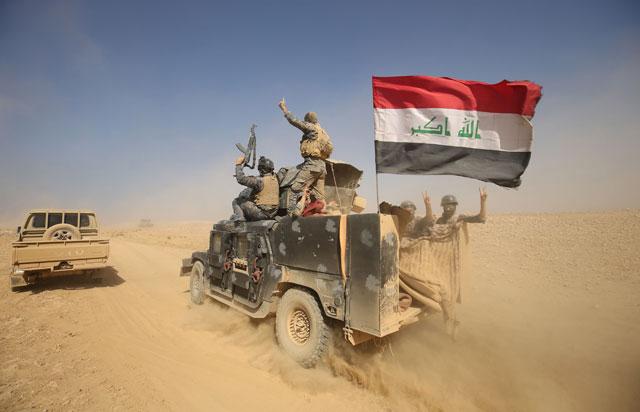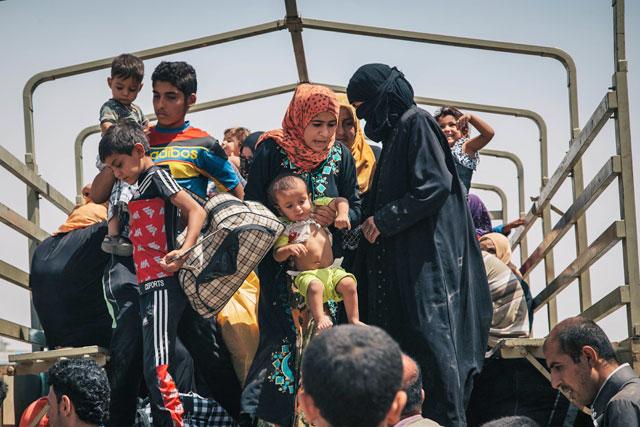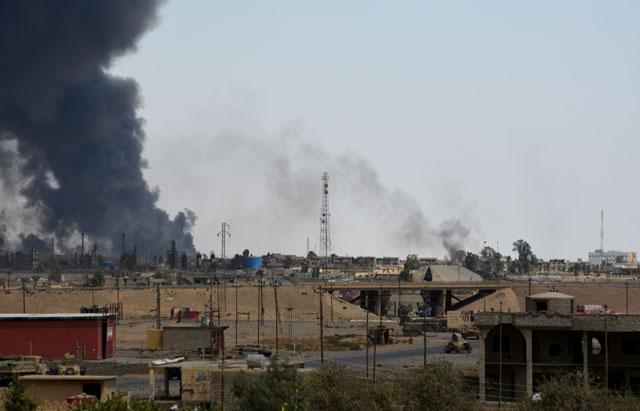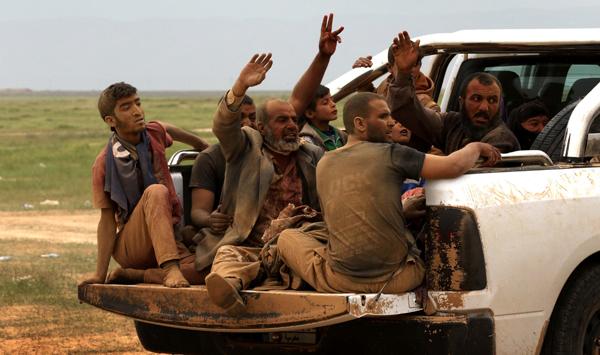You are here
Daesh leaders ‘abandon’ Mosul as Iraqi forces close in
By AFP - Oct 19,2016 - Last updated at Oct 19,2016

Iraqi forces deploy in the Bajwaniyah village, about 30km south of Mosul, on Tuesday after they liberated it from Daesh militants (AFP photo)
QAYYARAH, Iraq — Extremist leaders are fleeing Mosul, a top US general in the coalition battling the Daesh terror group said Wednesday as Iraqi forces closed in on the northern city.
Mosul was where Daesh supremo Abu Bakr Al Baghdadi declared his "caliphate" two years ago but is now the group's last major stronghold in Iraq.
Iraqi Prime Minister Haider Al Abadi, who announced the launch of a broad offensive to retake the city on Monday, visited the front line on Wednesday.
In the biggest Iraqi military operation in years, forces have retaken dozens of villages, mostly south and east of Mosul, and are planning multiple assaults for Thursday.
"We are telling Daesh that their leaders are abandoning them. We've seen a movement out of Mosul," said Major General Gary Volesky, who heads the anti-Daseh coalition's land component.
He told reporters in a video briefing that the many foreigners among the 3,000 to 4,500 Daesh fighters would likely end up forming the core of the holdout extremist force.
Volesky noted that the Iraqis would screen anyone leaving Mosul, and attempts by foreign fighters to blend in to an expected exodus of displaced people would be thwarted.
"It's difficult for them to blend into the local population based on the number of different types of foreign fighters that there are," he said.
Hundreds of thousands of civilians were still trapped in the city with dwindling supplies, many sheltering in basements as air strikes intensified on Daesh targets.
'Cut off from world'
"We couldn't sleep last night because of the air strikes. The explosions were huge," said Abu Saif, a 47-year-old resident contacted by AFP.
“Many families are starting to run out of some basic food goods, there is no commercial activity in Mosul — the city is cut off from the world,” he said.
East of Mosul, forces were poised for an assault on Qaraqosh, which lies about 15 kilometres away and was once Iraq’s largest Christian town.
News of the move to recapture Qaraqosh sparked jubilation among Christians who had fled the town, with many dancing and singing in the Iraqi Kurdish city of Erbil on Tuesday night.
Units from Iraq’s elite counterterrorism service, which has done the heavy lifting in most recent operations against Daesh, were poised to flush extremists out of the town, officers said.
“We are surrounding Hamdaniya now,” Lieutenant General Riyadh Tawfiq, commander of Iraq’s ground forces, told AFP at the main staging base of Qayyarah, referring to the district that includes Qaraqosh.
“There are some pockets [of resistance], some clashes, they send car bombs — but it will not help them,” he said.
Qaraqosh was the largest of many Christian towns and villages seized by the militants who swept across the Nineveh plain east of Mosul in August 2014.
The mass exodus it sparked displaced a large proportion of Iraq’s already dwindling Christian minority, sending most into the neighbouring Kurdish region.
Qaraqosh was home to around 50,000 people in 2014 and has at least seven churches, making it a key hub for the more than 300,000 Christians still in Iraq.
Kurdish peshmerga forces prepared to attack Daesh positions on several fronts north of Mosul while federal forces worked their way up the Tigris Valley.
The “caliphate” Baghdadi proclaimed in Mosul’s Great Mosque in June 2014 once covered more than a third of Iraq and parts of Syria.
But it has been shrinking steadily for more than a year and retaking Mosul would be a major setback for Daesh, all but ending its experiment in statehood.
“[Daesh] simply has too many enemies with the world arrayed against it,” said Aymenn Al Tamimi, an expert at the Middle East Forum.
No safe exit
Tens of thousands of personnel are involved in the operation to retake Mosul, far outnumbering Daesh fighters.
World leaders and military commanders warned that — despite signs that early progress in the Mosul offensive was faster than predicted — the battle could be long and difficult.
“Mosul will be a difficult fight. There will be advances and there will be setbacks,” Obama said on Tuesday.
After clearing towns and villages on the outskirts of Mosul with air support from the US-led coalition, Iraqi forces are expected to besiege the city before entering it.
Iraqi forces may allow fleeing Daesh fighters an exit to the west in a bid to minimise human and material losses.
But the chief of Russia’s general staff, Valery Gerasimov, argued it was “necessary not to drive terrorists from one country to the other but to destroy them on the spot”.
Russia, he said, was focusing on “possible attempts by fighters to break out of Mosul” and “freely leave the city in the direction of Syria”.
Many civilians have been able to flee the wider Mosul region to safer areas, with some desperate enough to seek refuge over the border in war-torn Syria.
“Thousands of desperate Iraqis are fleeing to a filthy and overcrowded Syrian refugee camp in an effort to escape the Mosul offensive,” Save The Children aid group said.
It said about 5,000 of them had reached the Hol camp inside Syria near the Iraqi border in the past 10 days.
Related Articles
KIRKUK, Iraq — Iraqi special forces led an operation on Tuesday aimed at retaking the extremist-held town of Qayyarah, a key staging base fo
QAYYARAH, Iraq — Iraqi forces on Thursday pushed the Daesh terror group from Qayyarah, a northern town considered strategic for any future o
MAKHMUR, Iraq — Thousands of desperate civilians were fleeing fighting Sunday on the new front opened by Iraqi forces against the Daesh terr

















